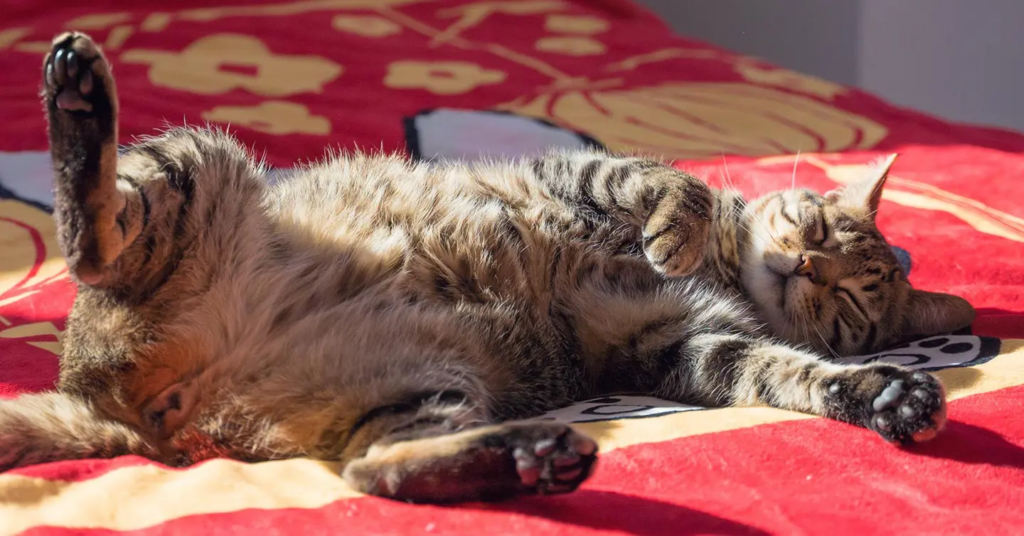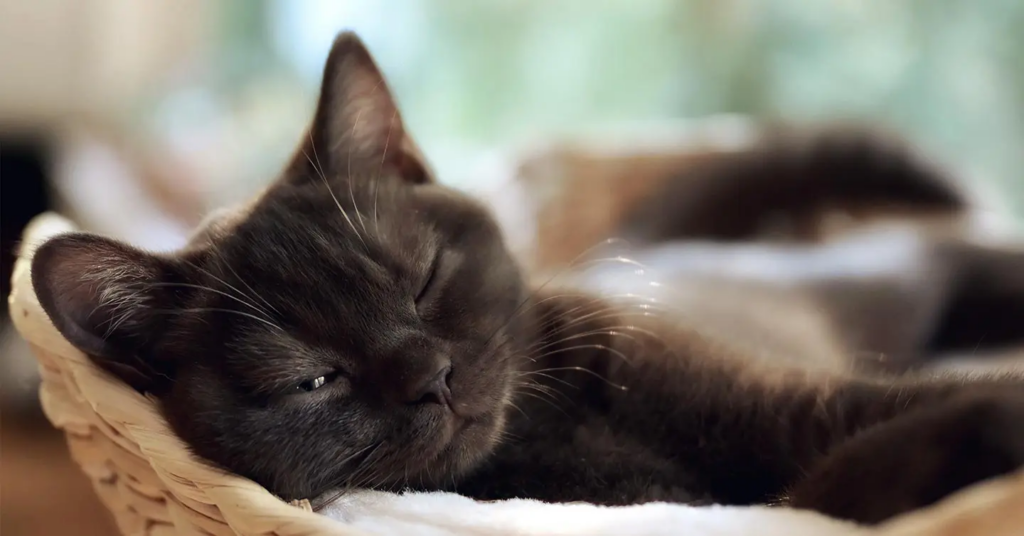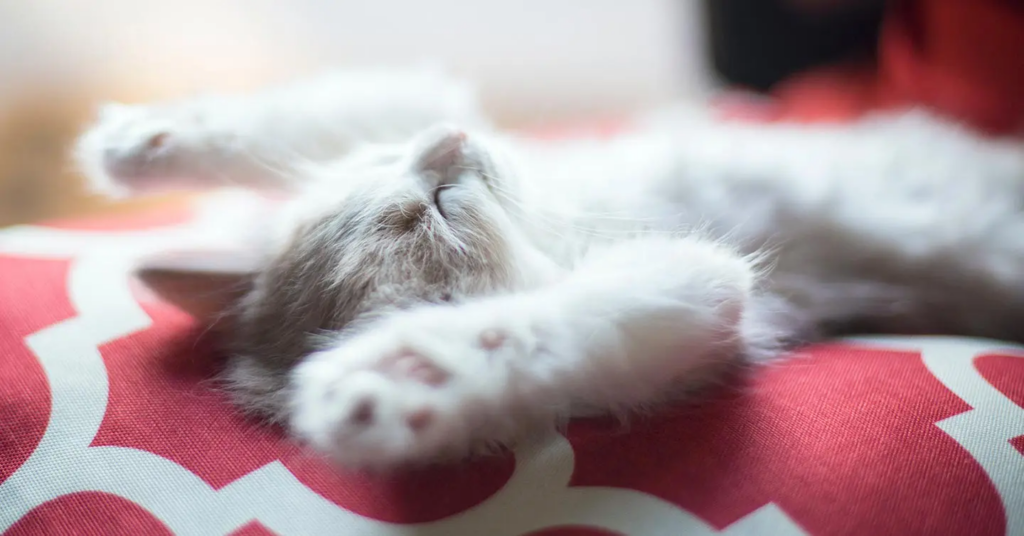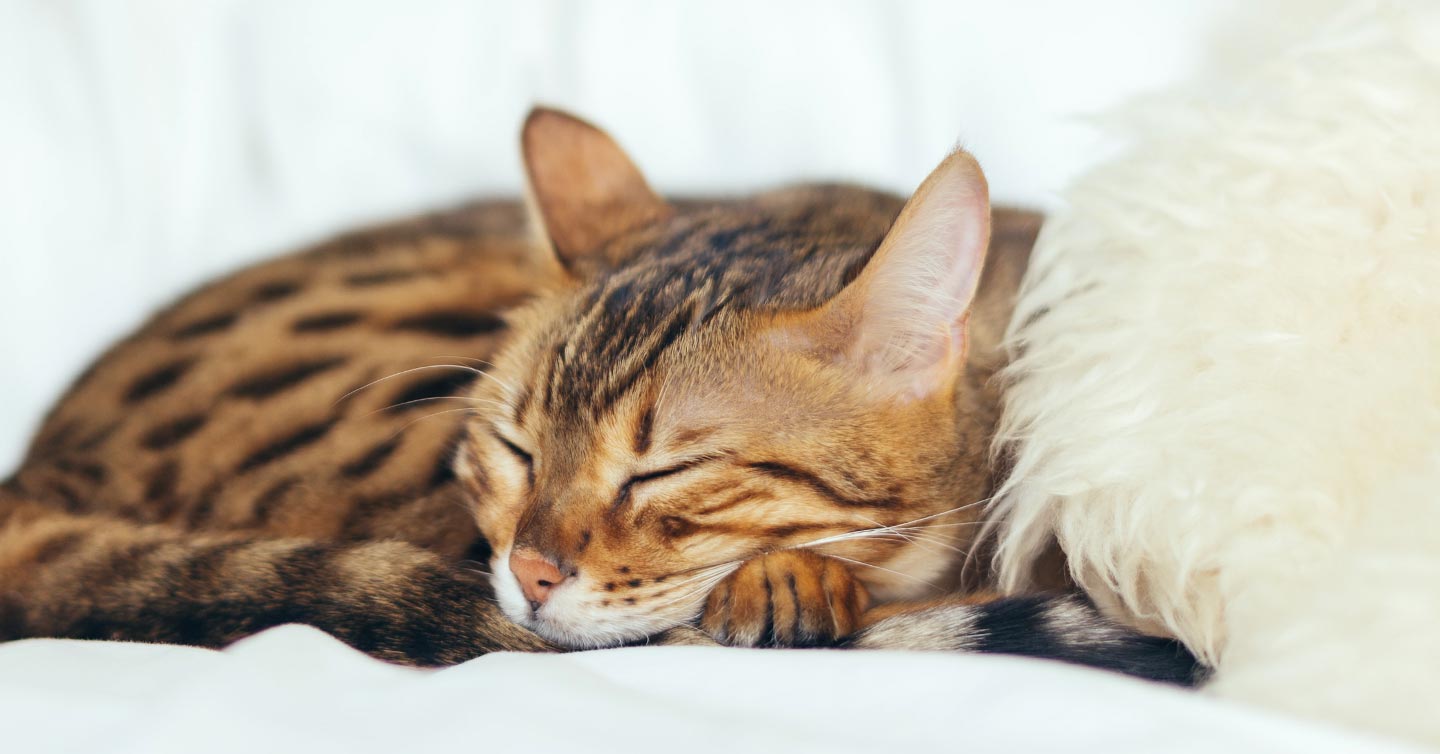Key Points
- Cats are natural nappers; it’s normal for them to sleep for a significant portion of the day.
- Cats require short bursts of sleep during daylight hours, allowing them to conserve energy and be ready to pounce at any moment.
- A sudden increase in sleep or changes in sleep patterns can be a sign of boredom, stress, or an underlying medical condition.
A good long nap is always a welcome indulgence, but you would probably feel pretty lazy after napping three or four times in a single day. However, if your feline friend is grabbing multiple cat naps a day, that doesn’t mean they’re lying down on the job.
So, why do cats sleep so much?
Regular cat naps are about more than catching a few extra Z’s. Cats are natural predators with ingrained instincts that affect their sleeping habits. In this guide, you’ll learn six reasons why cats seem to be perpetually in Do Not Disturb mode, plus what to do if your cat really is sleeping too much.
1. Cats are crepuscular
Not quite nocturnal, cats are crepuscular — meaning they’re most active during the twilight hours of dawn and dusk.
Their natural hunting instincts paired with superior night vision make those low-light hours the perfect time to stalk and hunt. So while you’re sleeping, your cat might be prowling the house. This also explains why your cat sleeps so much when you’re awake: they need to catch up.
It’s not unusual for adult cats to have between 12 and 20 hours of sleep per day (yes, that’s like two whole workdays for humans). But your pampered indoor cat can also adapt their sleep schedules to match yours. If you want to try to get your cat on the same sleep schedule as you, provide enough playtime and mental and physical stimulation during the day.

2. They’re taking a cat nap
Most of the time, your cat isn’t actually sleeping but napping. There’s a reason why quick naps are called “cat naps.” These short, light naps usually last about 15-30 minutes and make up 75% of a cat’s sleep.
The other 25% is spent in deep sleep, which lasts about 10-15 mins. This is the time their bodies heal and regenerate, getting them ready for their next round of, well, naps.
But there’s a method to this madness: it allows your cat to stay alert. If you look closely at the way your cat sleeps during a cat nap, you may see that they’re positioned for a quick getaway. This “ready to pounce” posture is a nod to their wildcat ancestors, who needed to be alert to prey and predators while they slept. Sleeping with one eye open is another classic wild cat move. But it’s not just lions and tigers; your average tabby has this hardwired into their DNA too.
3. They’re conserving energy
As natural predators, cats need to be ready to hunt at any given moment. Stalking, chasing, and leaping takes serious energy, so it’s important for them to stockpile their energy.
Here’s the thing, cats are sprinters, not marathon runners. They exercise in short bursts and get tired quickly. For a wild cat, a successful hunt can deplete a lot of their energy reserves. Meanwhile, your house cat might feel exhausted just from hopping from the couch to the floor.
But whether hunting in the wild or strutting around the house, a cat must always be ready to pounce, so they need to recharge their batteries often.
4. They’re bored
What do you do when you’re bored and have nothing going on? Most likely, you sleep — and the same goes for cats. When your cat doesn’t get enough mental and physical stimulation, they get bored. This can lead to excessive sleeping since there’s nothing better to do.
But a bored cat is an unhealthy cat. Their natural instincts to stalk, chase, and explore are stifled, and this can significantly affect their well-being.
It’s your duty as a cat parent to provide your cat with plenty of stimulation through regular play sessions and cat toys like puzzle feeders and scratching posts.

5. They’re stressed or scared
If you’ve recently moved or introduced a new pet or family member to the mix, you might catch your cat sleeping more. Changes in the environment can trigger stress in cats, and they may need more shut-eye to cope.
Just like how a tub of ice cream can be a remedy for a stressful day, sleeping is a coping mechanism for your cat. It’s important to provide safe spaces for your cat to retreat to when they’re feeling stressed.
As with any stressful situation, identifying the root cause is key. If you can pinpoint what’s triggering your cat’s anxiety, you can take steps to minimize or eliminate it.
6. They’re not feeling well
While cats are notorious for napping, excessive sleeping can be a sign that something’s wrong. In this case, an underlying health issue could be to blame.
Diabetes, obesity, kidney disease, heart disease, liver disease, cancer, and arthritis can all affect a cat’s sleep. Of course, you don’t want to mistake a normal cat nap for cancer. Besides sleepiness, observe your cat for other symptoms, such as sudden changes in appetite, activity levels, and litter box habits. Regular checkups with your veterinarian are also essential to catch health problems early.
If you do notice any concerning changes in behavior or sleeping habits, consult your vet immediately. Early diagnosis and treatment can make a world of difference in the outcome. And when the unexpected does happen, Pumpkin Cat Insurance plans can help cover the cost of eligible vet bills in the future.
How much sleep is too much for a cat?

Cats are professional nappers, but how much sleep is too much? The answer is a bit nuanced. Depending on different life stages, cats have different sleeping needs:
- Newborn kittens sleep almost 22 hours per day, only waking up to feed.
- Young kittens (3 months) sleep around 18 hours per day.
- Adult cats sleep between 12-16 hours per day.
- Senior cats may sleep more than adult cats due to reduced energy levels.
Of course, every cat is an individual, and you know your kitty best. So, if your cat suddenly starts sleeping for extended periods and skipping meals, or if you notice any other significant changes in their sleep habits, consult your vet to rule out any health problems.
The bottom line: It’s always nap time
So, why do cats sleep so much? It’s in their nature! From their crepuscular tendencies to their need to conserve energy, there are plenty of reasons why your cat always seems to be snoozing. Take advantage of their sleepy nature and enjoy some quality cuddle time.
But even the most dedicated couch potato needs exercise. Cats need a balance of play, exploration, rest, and mental stimulation to stay happy and healthy. So, grab that feather wand and indulge your cat in a game of chase before they curl up for the next well-deserved cat nap.
FAQs
-
- https://www.cumberlandanimalclinic.com/site/blog/2022/09/15/cat-sleeps-constantly-when-should-worry
- https://uk.frontline.com/pet-advice/why-do-cats-sleep-so-much
- https://www.iflscience.com/do-cats-sleep-with-their-eyes-open-67637
- https://www.nps.gov/samo/learn/management/cats.htm
- https://www.mountpleasant.com.sg/education/cat-exercise-mental-stimulation/
- https://www.cbc.ca/life/pets/boredom-can-be-bad-for-your-cat-s-health-here-s-how-you-can-help-1.6583934
- https://pmc.ncbi.nlm.nih.gov/articles/PMC10816390
- https://arborpethospital.com/blog/why-do-cats-sleep-so-much/
- https://nexgard.com.au/pet-care/cat-care/why-cat-sleep-so-much
- https://www.vets4pets.com/pet-health-advice/cat-advice/kitten/a-guide-to-kitten-sleeping-habits
- https://www.uk.sheba.com/blog/health/how-long-do-cats-sleep
- https://www.sleepfoundation.org/animals-and-sleep/how-much-do-cats-sleep
- https://my.clevelandclinic.org/health/body/12148-sleep-basics
- https://www.purina.co.uk/articles/cats/behaviour/common-questions/do-cats-dream




